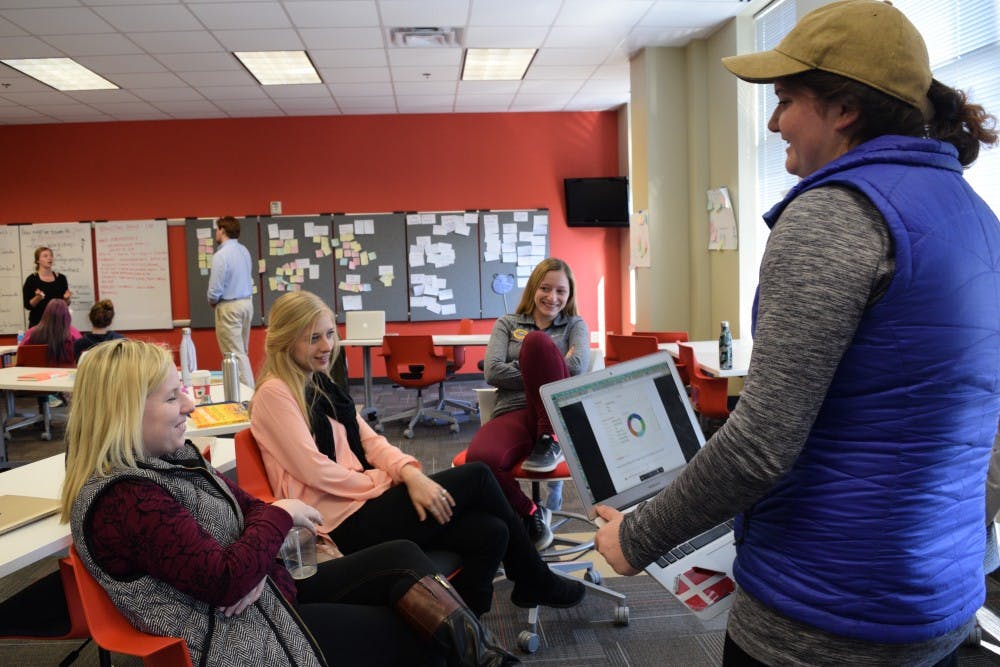Senior Tyson Glover wanted to finish off his last year at Elon University with an experience that was both memorable and engaging.
This is why Glover, a strategic communications major, applied to be a part of the Design Thinking Studio in Social Innovation, an immersive semester program launched by Elon this spring. The course, which counts for 16 credit hours and is made up of a cohort of 14 juniors and seniors from varying fields of study, is focused on cultivating unique problem-solving strategies.
“It’s unlike any class in the traditional sense that I’ve ever had,” Glover said. “It doesn’t feel like class. It feels like everyone is extremely engaged in what we’re doing.”
Taught by four professors from different disciplines, the design thinking program aims to equip students with the skills needed to tackle real-world problems with efficiency, creativity and empathy. During the first three weeks of the program, students have been learning the fundamentals of design thinking though interactive group activities before beginning work on their community-based projects in Alamance County.
These projects will take up the bulk of the semester program and provide students with a chance to engage the community and take on real social problems. Students are partnering with the Wellness Collaborative and the Food Collaborative, both of which are supported by Healthy Alamance and Impact Alamance.
“Design thinking is a set of methodologies that inspire people to think creatively and collaboratively about large-scale, ‘wicked’ problems facing their organizations, their communities, or society at large,” said William Moner, assistant professor of Communications. “These problems — poverty, sustainability, or, in our case, wellness — cannot be solved through top-down solutions or bureaucracy. Solutions exist in the very communities affected by these problems. The role of design thinking is to empathize and work creatively with the affected populations.”
Moner, Rebecca Pope-Ruark, associate professor of English, Phillip Motley, associate professor of Communications, and Joel Hollingsworth, senior lecturer in Computing Sciences, all had a hand in creating the program. Pope-Ruark, Motley and Hollingsworth are teaching it this semester.
Students are eager to collaborate with one another in an effort to put their design thinking skills to use in the community. Ansley Hamilton, a junior media analytics major, said their upcoming community projects will be unlike traditional class assignments, which usually carry no true significance past the end of the semester.
“It’s an opportunity to really work on something that then has a longer lasting impact than just the grade you get on it,” Hamilton said.
Before applying design thinking strategies to problems in Alamance County, students learned about creative thought methods through hands-on group activities. On the first day of class, students were asked to reinvent the name tag by creating new prototypes. While some students designed hats labeled with names and interests, others managed to turn paper fortune tellers into forms of identification. Students also worked together by using twisty straws to create a contraption capable of holding a racquetball.
Kendra Sterneck, a senior public health major, said the most challenging part of the course so far was letting go of her belief that she wasn’t a designer.
“[Small group projects] have been difficult for me because it’s just so out of my realm, but it’s been very eye-opening to me,” Sterneck said. “I’ve never really thought of myself as a creative person, but they’ve really pushed us to believe that we all are creative.”
The program is open to upperclassmen of all majors because of its applicability to multiple disciplines.
“To be successful in design thinking, you have to bring in a lot of different skills and backgrounds. You’re working with other people because it’s all about person-centered work,” Sterneck said. “We all have very different skills so I’m excited to see how those skills fall into different roles and how we will be able to bring that into the community and hopefully build strong relationships and create some sort of change.”
As for Glover, he could not have found a better way to cap off his Elon experience than by participating in a program that is an innovative step toward the future of higher education.
“It’s a very exciting time to be at Elon,” Glover said. “The fact that Elon is once again being innovative and taking steps forward into that realm of design thinking is amazing. I think we’re going to look back years from now and see that they were, once again, really ahead of the curve.”
Editor's Note: The original version of this story that appeared online and in The Pendulum included a number of errors. The program is partnering with the Food Collaborative and the Wellness Collaborative. And William Moner is not a professor of design thinking — there is no such distinction. Elon News Network regrets the errors.


